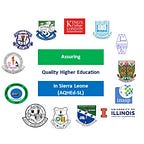Supporting students for agricultural growth in Sierra Leone
How engagement with employers through AQHEd-SL is helping Njala University support students to develop the skills they need to contribute to national food security after they graduate
There are very many acres of good agricultural land in Sierra Leone. And yet Sierra Leone imports much of its food from other countries.
In universities such as Njala University, which leads the agricultural cluster within the AQHEd-SL project, there are plenty of students studying agriculture.
But there has been a disconnect. There has been a gap between what students learn in university and what skills they need for employment in their sector after university. And many agriculture students head straight to the cities to look for work when they graduate.
This is where AQHEd-SL (Assuring Quality Higher Education in Sierra Leone) comes in. The project, part of the UK aid-funded SPHEIR programme, aims to boost quality assurance and outcome-based learning across all of Sierra Leone’s higher education institutions. For Sierra Leone’s agricultural sector that should mean graduates with the skills they need for jobs in farming.
This skills alignment comes through the work that has been going on across AQHEd-SL since the project began in 2018. Lecturers have been working to redesign courses to better align with the skills needed after university, including many in the agriculture cluster. Feeding into the course redesign and skills alignment process has been pedagogy development and incorporation of critical thinking skills development. And, alongside this, improved quality assurance has helped drive up standards and consistency and brought skills alignment across the countries higher education sector.
All of this helps improve the educational experience for students and deepens their skillset, but it does not necessarily make a difference to where students choose to seek work. It does not on its own inspire more agricultural students to look for jobs in the farming sector.
Bridging the gap
The need to bridge that gap between university courses and relevant employment is why stakeholder engagement is another key part of the AQHEd-SL project. External stakeholders play a range of important roles in the project, including in curriculum review, in supporting careers fairs and in providing guest lectures.
At Njala University, coordinated by AQHEd-SL project officer Monya Konneh Jnr, guest lecturers from the agriculture sector have been helping to inspire students about the potential to use their degrees to help improve Sierra Leone’s domestic food production when they graduate.
One example is Mr Kabia, CEO of Kabia Farms, a large agricultural company in the country. Mr Kabia recently visited Njala and spoke to a packed lecture room — 167 agriculture students from across all the years. He inspired the students about the potential to build successful businesses themselves out of farming. He also inspired them about the potential roles for women as entrepreneurs in agriculture, challenging some gender expectations that female roles were limited to low-paid, manual work.
Following on from his lecture, many students were keen to try these ideas out for themselves. So Mr Kabia is now working with Njala to develop a student farm so students can learn about all the aspects of an agriculture business and gain practical experience. They will be using seeds from Kabia Farms and selling their resulting produce through Kabia. This will generate income for the students to help pay their tuition fees and give them insight into the potential of working in agriculture. And some of them could get jobs with Kabia Farms at the end.
Another example is the entrepreneur Mr Wilfred Samking, who also came to do a guest lecture at Njala. He also inspired the agriculture students about the business potential of what they are studying. Following his lecture he provided some funding to Njala to support business planning and project development in areas like animal husbandry. He is keen to build stronger partnerships between universities and businesses in Sierra Leone and has been talking to TEC about how to expand this approach at a national level.
Stakeholder engagement such as these has been an important part of the AQHEd-SL project across the universities in Sierra Leone and it is good to see the long-term commitment of business partners to continue this engagement beyond the lifetime of AQHEd-SL.
